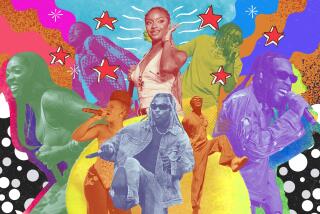Prince Eyango Aims His Songs at the Soul--and the Feet
- Share via
Cameroonian singer, songwriter and bandleader Ededi Eyango isn’t concerned if Western listeners miss out on the messages in songs he’s written about the politics, social conditions or cultural life of his West African homeland.
That’s not to suggest he doesn’t care about his lyrics, says Eyango, who brings his Les Mantagnards d’Afrique troupe to San Juan Capistrano today. It’s just that he knows that some things speak louder than words.
“I always tell people this music doesn’t need a language,” says the 38-year-old musician, who usually sings in his native tongues of Douala and Bamileke, and whose royal moniker is an honorary one bestowed on him by admiring villagers. “It’s all based on melody, harmony and rhythm. When those are good, a song will appeal to anyone, no matter the language they speak.
“I was dancing like crazy and humming the melodies when I heard American pop songs on the radio as a kid,” he recalls. “I didn’t understand a word, but I loved it anyway. It made me happy, and I think what you remember about a song is how it makes you feel.”
There’s certainly a feel-good quality in Eyango’s energized makossa music. Unlike the traditional slow and mellow makossa--a folk music associated with the language, people and city of Douala in Cameroon--Eyango’s fast-paced style is more akin to contemporary Afro-pop, using electric instruments and mixing in R&B;, funk and reggae, as well as elements of soukous, calypso and zouk. He also plays other regional forms of Cameroonian music, including ambassy bey, ngono and bolodo.
Having grown up in poor, tiny, rural villages of Cameroon, Eyango later moved to France and, eventually, to the United States, which gave him a varied set of musical influences.
“I grew up listening to a lot of music, everything from French music to the Beatles, James Brown, George Clinton and Lionel Richie,” said Prince Eyango, the son of a pastor who died when Eyango was 11. “At first, my exposure to makossa music was very, very limited. It wasn’t until I was 17, when I left my village for the big city [Douala], that I got exposed to it through musicians like Manu Dibango, Eboa Lotin and San Fan Thomas.”
Before moving to France in 1984, the self-taught guitarist had developed a distinctive approach to the instrument that early on won him a spot playing lead for some of Cameroon’s top makossa artists. He had planned to study music in Paris, but within a year of moving there, he got a record deal after a record company executive fell in love with his demo. His debut album, “Service Libre,” was the first of five for several Paris-based labels, with 1987’s “You Must Calculate” his most successful to date.
Looking for a new audience, Prince Eyango moved in 1993 to Los Angeles, where he’s recorded his last three CDs--including his most recent, 1998’s “Si Tu Mes Mens” (If You Lie to Me).
Prince Eyango and his ensemble of musicians and dancers--Les Montagnards d’Afrique translates as “the mountain people of Africa”--tour regularly throughout Europe, Africa, Canada and the U.S., including recent high-profile gigs at Houston’s International Jazz Festival, the Global Culture Festival in San Francisco and the New Orleans Jazz Festival.
“What I’m trying to do now is find the middle ground, where the music’s not too Westernized yet still reflects all of the styles I’ve absorbed over the years,” he says. “It’s very natural for me to go from one style to another. . . . I just do what feels right without caring about what the mainstream or marketplace wants at any given time.
“I believe this is music that is good for both the soul and one’s feet,” he adds. “We encourage everyone to dance at our shows . . . get caught up in the beat, swept up in the moment. I love this music, but the whole point is touching others enough to lift all our spirits.”
* Prince Eyango and Les Mantagnards d’Afrique perform today at the San Juan Capistrano Regional Library, 31495 El Camino Real. 7 and 9 p.m. $3-$7. (949) 248-7469.
More to Read
The biggest entertainment stories
Get our big stories about Hollywood, film, television, music, arts, culture and more right in your inbox as soon as they publish.
You may occasionally receive promotional content from the Los Angeles Times.








